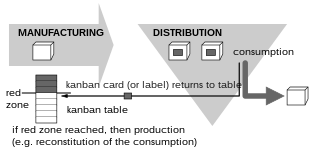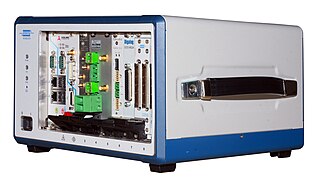
In commerce, supply-chain management (SCM), the management of the flow of goods and services, involves the movement and storage of raw materials, of work-in-process inventory, and of finished goods from point of origin to point of consumption. Interconnected or interlinked networks, channels and node businesses combine in the provision of products and services required by end customers in a supply chain. Supply-chain management has been defined as the "design, planning, execution, control, and monitoring of supply-chain activities with the objective of creating net value, building a competitive infrastructure, leveraging worldwide logistics, synchronizing supply with demand and measuring performance globally." SCM practice draws heavily from the areas of industrial engineering, systems engineering, operations management, logistics, procurement, information technology, and marketing and strives for an integrated approach. Marketing channels play an important role in supply-chain management. Current research in supply-chain management is concerned with topics related to sustainability and risk management, among others. Some suggest that the “people dimension” of SCM, ethical issues, internal integration, transparency/visibility, and human capital/talent management are topics that have, so far, been underrepresented on the research agenda.
Diversity, diversify, or diverse may refer to:

A supply chain is a system of organizations, people, activities, information, and resources involved in moving a product or service from supplier to customer. Supply chain activities involve the transformation of natural resources, raw materials, and components into a finished product that is delivered to the end customer. In sophisticated supply chain systems, used products may re-enter the supply chain at any point where residual value is recyclable. Supply chains link value chains.

Kanban (看板) is a scheduling system for lean manufacturing and just-in-time manufacturing (JIT). Taiichi Ohno, an industrial engineer at Toyota, developed kanban to improve manufacturing efficiency. Kanban is one method to achieve JIT. The system takes its name from the cards that track production within a factory. For many in the automotive sector, kanban is known as the "Toyota nameplate system" and as such the term is not used by some other automakers.
A distributed control system (DCS) is a computerised control system for a process or plant usually with a large number of control loops, in which autonomous controllers are distributed throughout the system, but there is central operator supervisory control. This is in contrast to systems that use centralized controllers; either discrete controllers located at a central control room or within a central computer. The DCS concept increases reliability and reduces installation costs by localising control functions near the process plant, with remote monitoring and supervision.
A request for proposal (RFP) is a document that solicits proposal, often made through a bidding process, by an agency or company interested in procurement of a commodity, service, or valuable asset, to potential suppliers to submit business proposals. It is submitted early in the procurement cycle, either at the preliminary study, or procurement stage.
Procurement is the process of finding and agreeing to terms, and acquiring goods, services, or works from an external source, often via a tendering or competitive bidding process. Procurement is used to ensure the buyer receives goods, services, or works at the best possible price when aspects such as quality, quantity, time, and location are compared. Corporations and public bodies often define processes intended to promote fair and open competition for their business while minimizing risks such as exposure to fraud and collusion.
ISO/IEC 15504Information technology – Process assessment, also termed Software Process Improvement and Capability Determination (SPICE), is a set of technical standards documents for the computer software development process and related business management functions. It is one of the joint International Organization for Standardization (ISO) and International Electrotechnical Commission (IEC) standards, which was developed by the ISO and IEC joint subcommittee, ISO/IEC JTC 1/SC 7.
Capability Maturity Model Integration (CMMI) is a process level improvement training and appraisal program. Administered by the CMMI Institute, a subsidiary of ISACA, it was developed at Carnegie Mellon University (CMU). It is required by many United States Department of Defense (DoD) and U.S. Government contracts, especially in software development. CMU claims CMMI can be used to guide process improvement across a project, division, or an entire organization. CMMI defines the following maturity levels for processes: Initial, Managed, Defined, Quantitatively Managed, and Optimizing. Version 2.0 was published in 2018. CMMI is registered in the U.S. Patent and Trademark Office by CMU.
Purchasing refers to a business or organization attempting to acquire goods or services to accomplish its goals. Although there are several organizations that attempt to set standards in the purchasing process, processes can vary greatly between organizations. Typically the word “purchasing” is not used interchangeably with the word “procurement”, since procurement typically includes expediting, supplier quality, and transportation and logistics (T&L) in addition to purchasing.
An energy management system (EMS) is a system of computer-aided tools used by operators of electric utility grids to monitor, control, and optimize the performance of the generation and/or transmission system. Also, it could be used in small scale systems like microgrids.

PCI eXtensions for Instrumentation (PXI) is one of several modular electronic instrumentation platforms in current use. These platforms are used as a basis for building electronic test equipment, automation systems, and modular laboratory instruments. PXI is based on industry-standard computer buses and permits flexibility in building equipment. Often modules are fitted with custom software to manage the system.
Dimensions in data management and data warehousing contain relatively static data about such entities as geographical locations, customers, or products. Data captured by Slowly Changing Dimensions (SCDs) change slowly but unpredictably, rather than according to a regular schedule.
ISO/TS 16949 is an ISO technical specification aimed at the development of a quality management system that provides for continual improvement, emphasizing defect prevention and the reduction of variation and waste in the automotive industry supply chain. It is based on the ISO 9001 standard and the first edition was published in June 1999 as ISO/TS 16949:1999.
Supplier evaluation and supplier appraisal are terms used in business and refer to the process of evaluating and approving potential suppliers by quantitative assessment. The aim of the process is to ensure a portfolio of best-in-class suppliers is available for use. Supplier evaluation can also be applied to current suppliers in order to measure and monitor their performance for the purposes of ensuring contract compliance, reducing costs, mitigating risk and driving continuous improvement.
The international standard IEC 62304 – medical device software – software life cycle processes is a standard which specifies life cycle requirements for the development of medical software and software within medical devices. It is harmonized by the European Union (EU) and the United States (US), and therefore can be used as a benchmark to comply with regulatory requirements from both these markets.
Value Plastics is a designer, manufacturer, and global distributor of plastic tubing components used mainly in medical device, biotech, and industrial applications.
A single-use bioreactor or disposable bioreactor is a bioreactor with a disposable bag instead of a culture vessel. Typically, this refers to a bioreactor in which the lining in contact with the cell culture will be plastic, and this lining is encased within a more permanent structure. Commercial single-use bioreactors have been available since the end of the 1990s and are now made by several well-known producers.
Maxar Technologies Inc. is a space technology company headquartered in Westminster, Colorado, United States, specializing in manufacturing communication, earth observation, radar, and on-orbit servicing satellites, satellite products, and related services. DigitalGlobe and MDA Holdings Company merged to become Maxar Technologies on 5 October 2017. Maxar Technologies is the parent holding company of MacDonald, Dettwiler and Associates, Ltd., headquartered in Vancouver, British Columbia, Canada; Space Systems Loral, headquartered in Palo Alto, California, US; DigitalGlobe, headquartered in Westminster, Colorado, US; and Radiant Solutions, headquartered in Herndon, Virginia, US. Maxar Technologies is dual-listed on the Toronto Stock Exchange and New York Stock Exchange as MAXR.



